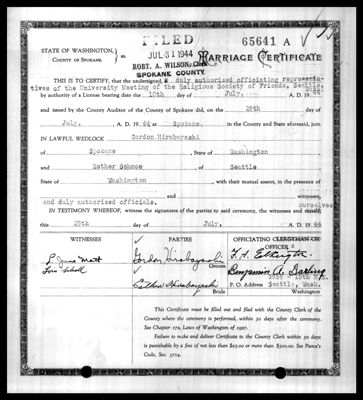Treasures of the Archives: Gordon Hirabayashi’s Quaker Wedding

“Japanese-American and White Girl Wed” proclaimed the newspapers after receiving word that activist Gordon Hirabayashi married his college sweetheart, Esther Schmoe, in a small Quaker ceremony on July 29, 1944. This wasn’t Hirabayashi’s first time in the news, nor would it be his last.
When America and Japan went to war in December of 1941, Japanese-Americans found themselves subject to special restrictions, including curfews and even forced relocation to internment camps. Some resisted. In 1943, Hirabayashi, an American citizen born in Seattle, intentionally broke curfew and refused to register for relocation to an internment camp, hoping to become a Supreme Court test case. Awaiting the outcome of his case, Hirabayashi moved to Spokane, taking up work with the Quaker-run American Friends Service Committee. He was convicted June 21, 1943. Since he was Japanese-American, Hirabayashi couldn’t serve his sentence inside the internment zones set up along the West Coast. So he hitchhiked his way down to Tucson, where he served his 90-day sentence alongside other pacifists and conscientious objectors.
Upon his return to Spokane, he faced new charges after refusing to fill out the “Statement of United States Citizen of Japanese Ancestry” (Selective Service Form 304A), used to determine Nikkei loyalty and draft eligibility. Knowing he would soon be in prison, Hirabayashi and Schmoe decided to get married quickly, while Hirabayashi was out on a $1000 bond.
As Hirabayashi explained to the New York Times, “I felt that the Constitution, as I understood it, gave me certain protections as a citizen under martial law.” In 1985, Hirabayashi was able to overturn the charges against him on appeal, and has received several national honors including the Presidential Medal of Freedom.
Here at the Digital Archives, you can find Hirabayashi and Schmoe’s 1944 wedding certificate. For more information about Gordon Hirabayashi please visit Historylink.org or pick up a copy of his autobiography. For more on Japanese relocation during WWII, please visit this National Archives page.

